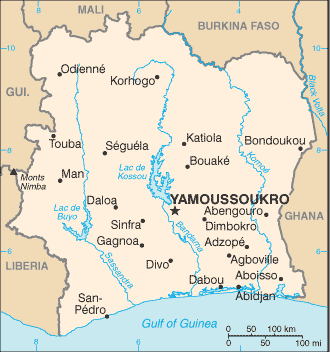 Benson, S. (2008, January 17). Côte d'Ivoire: Cours et cabinet tidiane - 69 sourds-muets formés en stylisme. "Nos enfants possèdent toutes les qualités pour contribuer au développement du pays à condition qu'on leur donne la chance de se former ou de poursuivre leurs études après la classe de CM2", a déclaré hier au siège des cours et cabinet Tidiane, à Koumas-si, François Abo, président des parents d'élèves de l'école ivoirienne pour les sourds (APEECIS).
Benson, S. (2008, January 17). Côte d'Ivoire: Cours et cabinet tidiane - 69 sourds-muets formés en stylisme. "Nos enfants possèdent toutes les qualités pour contribuer au développement du pays à condition qu'on leur donne la chance de se former ou de poursuivre leurs études après la classe de CM2", a déclaré hier au siège des cours et cabinet Tidiane, à Koumas-si, François Abo, président des parents d'élèves de l'école ivoirienne pour les sourds (APEECIS).
 Le Matin d'Abidjan. (2008, March 1). INTEGRATION SOCIO-ECONOMIQUE - Vers des stratégies pour mieux insérer les sourds. Handicap sensoriel le plus fréquent dans le monde, la surdité est une déficience auditive qui provoque une perte de la perception des sons. En Côte d'Ivoire, hormis l'Ecole ivoirienne pour les sourds, il n'y a pas véritablement de structure d'accueil des déficients auditifs, encore moins, des stratégies de lutte contre la surdité ni une politique nationale de prise en charge des personnes malentendantes.
Le Matin d'Abidjan. (2008, March 1). INTEGRATION SOCIO-ECONOMIQUE - Vers des stratégies pour mieux insérer les sourds. Handicap sensoriel le plus fréquent dans le monde, la surdité est une déficience auditive qui provoque une perte de la perception des sons. En Côte d'Ivoire, hormis l'Ecole ivoirienne pour les sourds, il n'y a pas véritablement de structure d'accueil des déficients auditifs, encore moins, des stratégies de lutte contre la surdité ni une politique nationale de prise en charge des personnes malentendantes.
 Surdité en Afrique.
7.CÔTE D'IVOIRE: École Ivoirienne pour les sourds, 03 B.P. 806 Abidjan 03. Soixante éléments des Forces terrestres se sont transformés en maçons, menuisiers, peintres... le temps d’une “mission de nomadisation”, en juillet et août 2002, pour offrir aux quatre vingt sept pensionnaires de: l’Ecole ivoirienne pour les sourds (EIS) de Yopougon, ainsi qu’à leurs encadreurs, des conditions de vie, de travail et un cadre plus agréables.
Surdité en Afrique.
7.CÔTE D'IVOIRE: École Ivoirienne pour les sourds, 03 B.P. 806 Abidjan 03. Soixante éléments des Forces terrestres se sont transformés en maçons, menuisiers, peintres... le temps d’une “mission de nomadisation”, en juillet et août 2002, pour offrir aux quatre vingt sept pensionnaires de: l’Ecole ivoirienne pour les sourds (EIS) de Yopougon, ainsi qu’à leurs encadreurs, des conditions de vie, de travail et un cadre plus agréables.
 Miles, M. (2005). Deaf people living and communication in African histories, c. 960s - 1960s. There is strong documentary evidence that deaf or hearing impaired men and women, girls and boys, did occupy social space and took roles across the full spectrum of life throughout Africa in earlier centuries, living lives like everyone else and also having some different experiences. Traces and signs of deaf people appear in many sorts of historical document, such as travellers' accounts, legal and genealogical records, government, institutional and missionary archives, linguistic studies, literature, folklore, religious narrative, mime, dance and drama. Many of their experiences have involved severe economic poverty and adversity, stigmatising attitudes and exclusionary practices; yet this has not been the norm everywhere in Africa, and many deaf people have shown great resilience, perseverance, humour and ingenuity in their dealings and communications with the non-deaf world.
Miles, M. (2005). Deaf people living and communication in African histories, c. 960s - 1960s. There is strong documentary evidence that deaf or hearing impaired men and women, girls and boys, did occupy social space and took roles across the full spectrum of life throughout Africa in earlier centuries, living lives like everyone else and also having some different experiences. Traces and signs of deaf people appear in many sorts of historical document, such as travellers' accounts, legal and genealogical records, government, institutional and missionary archives, linguistic studies, literature, folklore, religious narrative, mime, dance and drama. Many of their experiences have involved severe economic poverty and adversity, stigmatising attitudes and exclusionary practices; yet this has not been the norm everywhere in Africa, and many deaf people have shown great resilience, perseverance, humour and ingenuity in their dealings and communications with the non-deaf world.
 Association Nationale des Sourds de Cote d'Ivoire (ANASOCI).
Association Nationale des Sourds de Cote d'Ivoire (ANASOCI).
![]() David Bar-Tzur
David Bar-Tzur![]()

 Kamei, N.
Kamei, N. Miles, M. (2005).
Miles, M. (2005). 